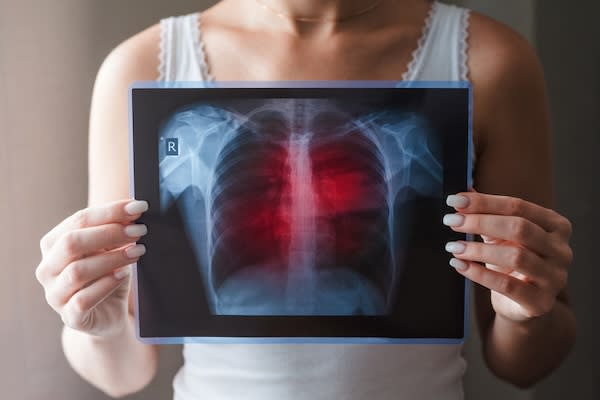Thoracic Surgery
Experts in Thoracic Surgery — Right by Your Side
At the Providence Swedish Cancer Institute, you have access to a nationally recognized thoracic surgery program led by highly skilled surgeons at the forefront of thoracic cancer care. Equally important, their mission isn’t just to perform successful surgery but to ensure patients and their loved ones feel informed, comfortable, and empowered throughout treatment.

Our Approach
Thoracic surgery requires specialized expertise in both the complex anatomical region within the chest cavity and highly sophisticated surgical technology. The surgeons at the Providence Swedish Cancer Institute are teachers and mentors for other physicians across Washington state because of their skill and experience.
Be confident knowing your surgeon is an expert in advanced technologies and minimally invasive surgical techniques for procedures designed to improve outcomes and quality of life. From your first interaction with us, you’ll find comfort in knowing you have an entire surgical team dedicated to supporting you.
Robotic Navigational Bronchoscopy for Lung Cancer
Advanced Thoracic Surgery
We offer advanced thoracic surgeries that focus on effective treatment while prioritizing quality of life. Surgical options include:
Other thoracic surgery options
Endoscopic surgery uses a thin, flexible tube with a camera to view and treat early-stage tumors in the esophagus or lungs. Techniques like endoscopic mucosal resection (EMR) and endoscopic submucosal dissection (ESD) allow for precise tumor removal without large incisions. These minimally invasive options can reduce pain, speed up recovery, and preserve surrounding tissue.
Surgery for esophageal cancer may involve removing part or all of the esophagus, depending on the tumor’s size and location. Whenever possible, we use minimally invasive approaches to reduce recovery time and complications. In more complex cases, open surgery may be necessary. Our team will choose the approach that offers the best chance for a successful outcome while prioritizing your safety and comfort.
Hyperthermic intraperitoneal chemotherapy (HIPEC) is used to treat cancers that have spread to the lining of the abdominal cavity, such as mesothelioma. After tumor removal surgery, heated chemotherapy is delivered directly into the abdomen to destroy remaining cancer cells. HIPEC is often used in combination with cytoreductive surgery. This targeted approach helps limit side effects and may improve long-term outcomes.
Lung lobectomy is the surgical removal of one of the five lobes of a lung. It can be performed with a traditional thoracotomy, or with a less invasive treatment option called video-assisted thoracic surgery (VATS). A lobectomy can improve survival rates and offer the best chance of a cure for some early-stage lung cancers.
During an open lung wedge resection, your surgeon makes an incision in the chest to remove a small, wedge-shaped section of diseased lung tissue. This procedure removes less lung tissue than a lobectomy, which can preserve greater lung function and result in a faster recovery.
Pleurectomy with decortication (P/D) is a lung-sparing surgery often used to treat mesothelioma. It involves removing the pleura — the lining around the lungs — and any visible tumor on the lung surface. This procedure helps relieve symptoms, improve lung function, and may slow the progression of cancer.
Pneumonectomy is a surgical procedure to remove an entire lung. Unlike smaller surgeries, a pneumonectomy can remove entire tumors and reduce the risk of spreading, especially when the cancer is centrally located, large, or involves multiple lobes.
Using small incisions and enhanced precision, robotic lung resection allows for targeted tumor removal with less pain, shorter hospital stays, and a faster return to daily life.
Robotic wedge resection is a type of robotic lung resection in which a wedge-shaped section of diseased or damaged lung tissue is removed with robotic assistance. This procedure allows for greater precision and smaller incisions than traditional surgery, which can lead to less pain, faster recovery, and minimal scarring — helping you return to daily activities sooner. This advanced procedure is available at select locations.
A segmentectomy is a surgical procedure to remove a part of an organ that contains a tumor. This approach helps preserve as much healthy tissue as possible while effectively treating the affected area, offering a less invasive option than removing the entire organ.
Sleeve lobectomy is a surgical procedure to remove a lung tumor while saving that part of the lung. It involves removing the cancer growth and part of the main bronchus (the airway), then rejoining the ends of the bronchus and the lung. This lung-sparing approach helps preserve breathing function and quality of life.
A thymectomy removes part or all of the thymus gland to treat thymic tumors. A radical thymectomy removes the entire gland and nearby tissue, while an extended thymectomy may also include surrounding structures if cancer has spread. Our surgeons use minimally invasive or robotic techniques when appropriate to support faster recovery and reduce complications.
VATS is a minimally invasive surgery that uses a tiny camera and small incisions to access the chest, allowing surgeons to remove tumors with less pain, faster healing, and fewer complications.
Wedge resection using VATS is a minimally invasive procedure in which a wedge-shaped section of diseased or damaged lung tissue is removed with video-camera assistance.
With video-camera assistance, surgeons have a clear and magnified view of the surgical area, allowing them to use smaller instruments and move with greater precision. This often results in less pain and scarring, and a quicker recovery. This advanced procedure is available at select locations.
What to Expect
Your care team takes time to understand you beyond your diagnosis — learning everything from your physical and emotional needs to your personal goals. This personalized approach is supported by the expertise of our entire thoracic cancer team. Our specialists collaborate in multidisciplinary tumor boards, where cancer experts come together to review complex cases and share insights.
About a week before surgery, we'll schedule a pre-admission visit to:
- Assist with any remaining pre-surgical lab work or tests
- Review what will happen during your surgery
- Explain potential side effects
- Discuss medications and post-surgery care, including in-home help or equipment if needed
You'll receive information to prepare for your hospital admission. If you have any questions after your pre-admission appointment, you can reach out to your nurse or care coordinator, who will be happy to help.
On the day of your surgery, you will meet with an anesthesiologist, who confirms details of your medical record, clarifies any questions about your medical history, and performs a physical exam.
During this time, you can discuss the plan for your care, express any concerns about potential side effects, and ask any questions that you have about the anesthesia.
The specifics of your surgery are determined by your surgery type and individual needs, but one factor is always consistent – you’re being treated by an expertly trained team of surgeons, anesthesiologists, surgical nurses, and technicians.
The length of your surgery depends on several factors, including the type of procedure, whether reconstruction is being done, and the complexity of the procedure. The care team will inform your loved ones of your progress and provide updates during surgery.
Following surgery, you’ll be moved to recovery where your care team can monitor your vital signs and manage your pain as the anesthesia wears off.
Postoperative care instructions will be provided before being discharged. Instructions could include information about wound care, how to use an incentive spirometer if applicable, activity restrictions, and pain management.
For more extensive surgeries – such as the removal of part or all of the lung – you may be required to stay overnight, or longer, to ensure proper recovery.
You’ll have several follow-up appointments after your procedure for the first few weeks. This helps us monitor your healing and manage any complications. As time goes on, your appointments will be less frequent, but regular checkups are required so that we can continue to manage any of your ongoing treatment needs and watch for any signs of recurrence.
Services are also available to help you through every treatment stage.
Learn more about our supportive care services.
Frequently Asked Questions
It’s natural to feel nervous about surgery, but your care team will talk you through the process, helping you prepare for surgery and answering all your questions well in advance.
As part of your personalized care plan, we offer advanced surgical options tailored to your diagnosis and goals, including minimally invasive procedures, when possible, along with reconstruction if needed. After surgery, we provide detailed recovery instructions and make sure that you have all the ongoing support you need to help you heal with confidence.
Surgery may be all that your care plan requires if your cancer was diagnosed in its early stages and hasn’t spread to other parts of the body.
However, surgery can be accompanied by medical oncology treatment such as chemotherapy, immunotherapy, hormone therapy and targeted therapy to meet your specific needs and give you the highest likelihood of a successful outcome.
Radiation may also be recommended to help shrink tumors prior to surgery or following surgery to decrease the chance of recurrence.
Your recovery time depends on which type of surgery you have.
You may be in the hospital for one or two days following your surgery, although some procedures are done on an outpatient basis. Some patients can return to their regular activities within a few weeks, while others may take longer.
Before surgery, your care team will walk you through what to expect and provide a detailed recovery plan. This includes guidance for managing pain, any activity restrictions, and information about follow-up visits — so you can make arrangements and feel confident going into surgery.
It may take about a month to resume your normal activities after thoracic surgery. However, much depends on your health before surgery, the type of surgery you have, and the types of activities you engage in.
Some activities that may be limited as you recover include driving, lifting anything over 10 pounds, and strenuous activity.
Yes, your surgical team wants you to quit smoking at least one month before your surgery. Not only does smoking cause cancer, but using tobacco products negatively impacts your recovery from thoracic surgeries, including the risk of having wound complications.
We understand that quitting smoking is very difficult. Your care team will provide you with resources to help make the process a little easier and support you as you make this important life change.
There’s no one-size-fits-all diet during cancer treatment but eating well can help you feel stronger and support your recovery. Many people find it helpful to focus on small, balanced meals with plenty of protein, fruits, vegetables, and whole grains. A Providence Swedish Cancer Institute nutritionist can help you find foods that work for your needs, manage side effects like nausea or appetite changes, and support your overall well-being throughout treatment.
Getting a second opinion can help you feel more confident in your diagnosis and treatment plan. If you’ve already been diagnosed somewhere else, we’re here to help you take the next step. Call 855-XCANCER, 855-922-6237 - our care coordinators will match you with the right cancer specialist and help schedule your visit. They can also work with your current physician to collect your medical records and test results.
We provide a full range of supportive care services to support you during and after your cancer treatment. Some of these services include:
- Art therapists
- Cancer rehabilitation (onco-physiatry)
- Care coordinators
- Genetic counseling (cancer geneticist)
- Health educators
- Medical massage (edema, lymphedema management)
- Music therapist
- Naturopaths
- Nutritionists
- Oncology nurses
- Social workers
- Speech and language pathology
We can also help with finances, food, transportation, and other challenges for eligible patients through our patient assistance fund.
See the full list of supportive care services.
Note: Some services are provided by local partners and vary based on location. Please contact your clinic for more information.
News & Info From Our Experts





